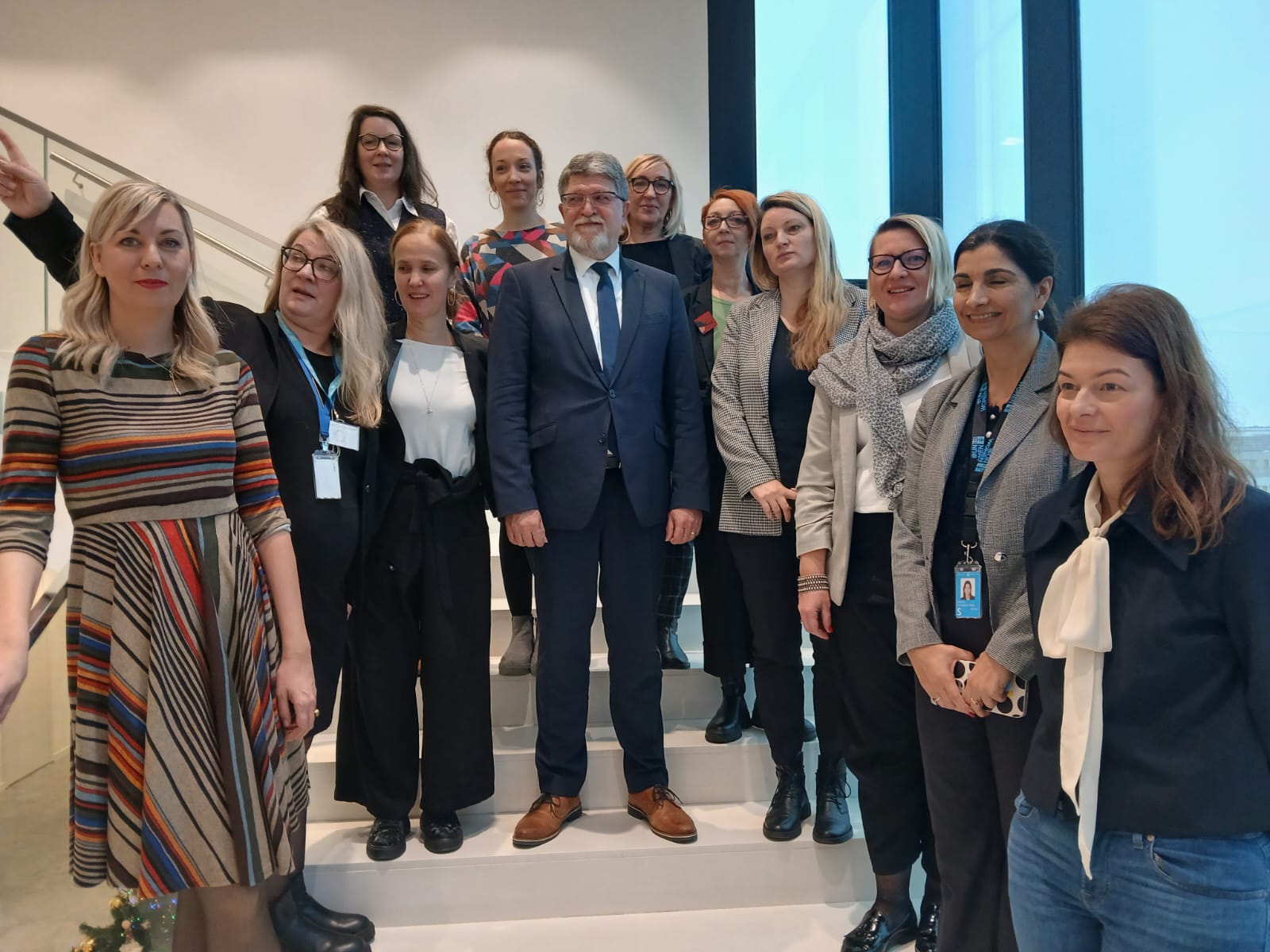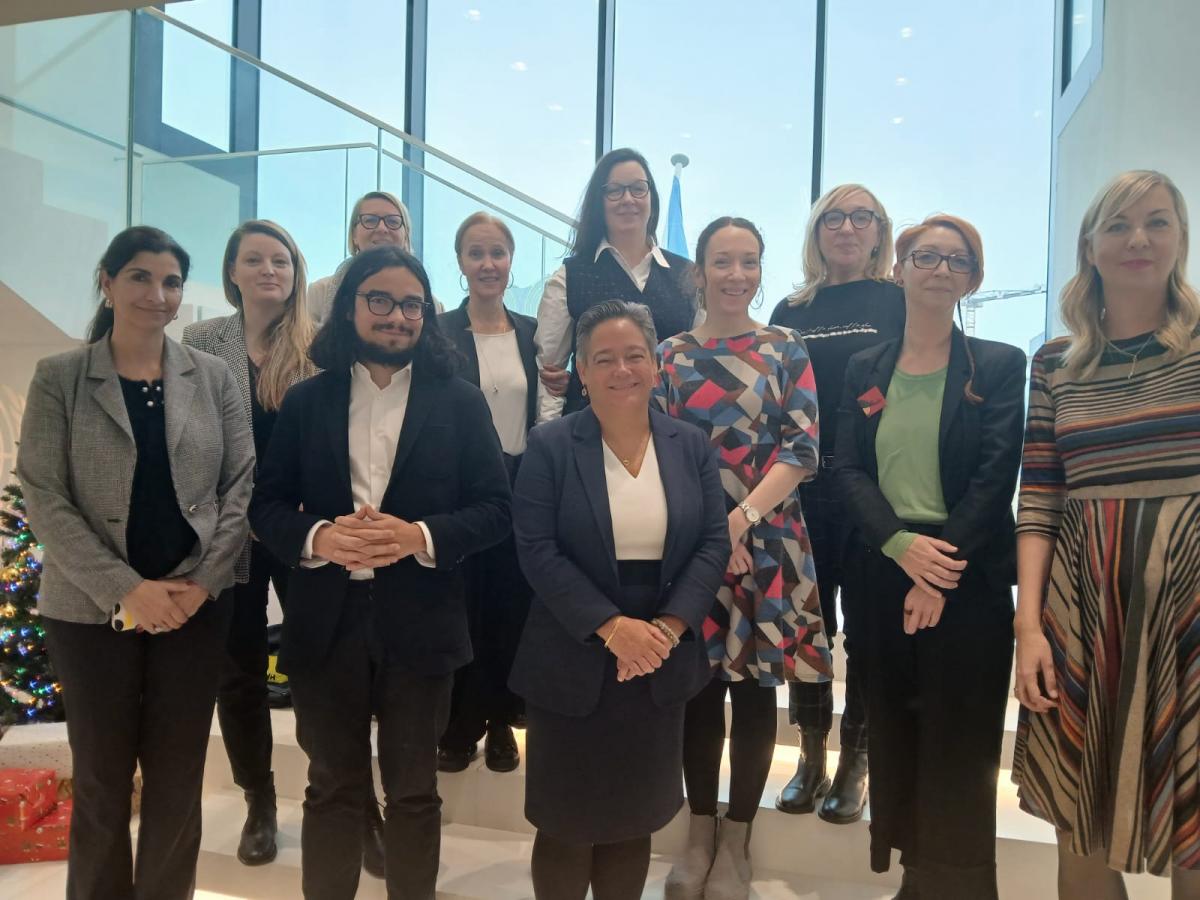Hotline: +381 61 63 84 071
Serbian Gender Advocates Strengthen EU Ties in Brussels Mission

Serbian Gender Advocates Strengthen EU Ties in Brussels Mission
11–12 December 2024
In December 2024, UN Women Serbia and a delegation of civil society organizations (CSOs) carried out a two-day mission to Brussels to deepen cooperation with European Union institutions and advance Serbia's gender equality agenda. The mission marked a step in Serbia’s broader efforts toward European integration, with gender equality and women’s rights playing a central role in aligning with EU standards and values.
The delegation consisted of UN Women Serbia representatives Milana Rikanović (Gender Specialist and Head of UN Women Serbia), Jelena Sekulić Nedeljković (Project Officer), and Ivana Tabasević (Operations Analyst), as well as five Serbian civil society activists: Biljana Stepanov (Center for Support of Women), Biljana Janjić (NGO FemPlatz), Sonja Tošković (Belgrade Center for Human Rights), Jelena Hrnjak (NGO Atina), and Sofija Mandić (NGO CERPIS). Each brought a wealth of experience and expertise in gender issues, human rights, and advocacy, forming a robust and unified voice in Brussels.
Strengthening Political Dialogue
The mission’s agenda opened with a bilateral meeting with Member of the European Parliament (MEP) Tonino Picula. This session provided a valuable opportunity to discuss how Serbia can better integrate gender equality into its EU accession framework and highlight ongoing efforts to address gender-based violence, the underrepresentation of women in politics, and the shrinking space for feminist activism. The conversation also explored avenues for closer alignment between EU political priorities and Serbia’s national strategies for gender equality and women’s empowerment.
Engagement with DG NEAR and Serbian Representation
One of the mission’s key moments was the meeting with representatives from DG NEAR (Directorate-General for Neighbourhood and Enlargement Negotiations), including Cindy Van den Boogert, Deputy Head of Unit for Serbia, and Jakub Stepaniuk, Policy Analyst. This discussion took a closer look at Serbia’s progress and persistent gaps in implementing gender-sensitive reforms as part of the EU integration process. The delegation emphasized the role of civil society in supporting democratic governance, safeguarding women’s rights, and holding institutions accountable. They also shared first-hand insights on challenges facing women and girls in Serbia, ranging from political marginalization to systemic violence.

Regional Exchange and Collaborative Workshop
The mission's second day culminated in a collaborative workshop that brought together representatives from EU member states, MEPs, national authorities, and CSOs from across the region, including Slovenia and Spain. This diverse, multi stakeholder setting created space for dialogue on regional best practices, common challenges, and opportunities for strengthening cooperation. The workshop provided a platform for Serbian CSOs to present their work and connect with European peers, building networks for future collaboration and policy advocacy.
The session recognized that gender equality is not a standalone issue but an integral component of democracy, social justice, and development. The presence of grassroots voices alongside policymakers reflected the mission’s core objective: to bridge the gap between institutional decision-making and the on-the-ground experiences of women in Serbia.
Towards a Gender-Equal Future
The Mission to Brussels reaffirmed Serbia’s OCD commitment to achieving gender equality as part of its European path. It highlighted the essential role of civil society in shaping inclusive policies and ensuring that women’s voices are heard and reflected in institutional frameworks. The delegation brought key issues to the forefront of the EU-Serbia dialogue through meetings, partnerships, and collaborative exchanges.
As the country continues its EU integration journey, this mission served as a timely reminder that actual progress lies in cooperation, accountability, and the unwavering dedication of those working every day to defend and advance the rights of women and girls. UN Women Serbia and its civil society partners have once again demonstrated that change begins with dialogue—and that transformative change happens when that dialogue is inclusive, strategic, and deeply grounded in lived experience.
Voices Behind the Mission: Civil Society Leadership
The mission was enriched by the contributions of the CSO and gender expert delegates, each of whom is a leader in her respective field.
Biljana Stepanov, Director of the Center for Support of Women and President of the Board of the SOS Vojvodina Network, brought over two decades of experience addressing gender-based violence, promoting human security, and shaping public policies across the Western Balkans. Her work spans criminal justice reform, firearm-related violence prevention, and policy evaluation, making her one of the region’s foremost voices on integrated gender policy.
Biljana Janjić, Executive Director of FemPlatz, offered deep expertise in feminist advocacy and public policy. Her organization works at the intersection of research, activism, and law, monitoring the state of women’s rights in Serbia and pushing for progressive legislation to combat femicide and support women’s civil and political participation.
Sonja Tošković, Executive Director of the Belgrade Centre for Human Rights, has spent over 15 years advancing human rights protection mechanisms in Serbia. With a strong legal background and leadership positions in regional and European networks such as the European Council on Refugees and Exiles (ECRE), she brings a global perspective to human rights-based policy reform.
Jelena Hrnjak, Programme Manager at NGO Atina, is one of Serbia’s leading experts in combating human trafficking and supporting survivors of sexual exploitation. For 16 years, she has overseen comprehensive social inclusion programs and worked closely with international institutions. Her professional background also includes journalism and global leadership development, reinforcing her multifaceted approach to advocacy.
Sofija Mandić is a Serbian lawyer, human rights activist, and member of the National Election Commission who has been involved with the Women’s Platform for Development of Serbia since 2014 and currently works at the Center for Judicial Research (CEPRIS). She is also the general secretary and author at Peščanik media, contributing extensively to analyses on the rule of law and human rights in Serbia. In 2023, she authored In the Circle of Negation about Serbia’s parliamentary silence on its wartime past.












 FACEBOOK
FACEBOOK TWITTER
TWITTER YOUTUBE
YOUTUBE